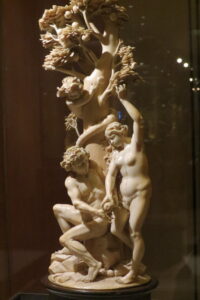A: I’ve been reflecting for the past few days on the suffering inflicted by Anders Breivik on everybody everywhere who’s capable of loving their God and loving their neighbours as themselves.
Several news reports have referred to a 1,500 page manifesto that Breivik posted on the Internet shortly before the Norway attacks. Apparently Breivik copied a number of sections almost word from word from the writings of several well-known far-right ideologues. (Which just goes to show, once again, that psychopaths are very good at “cutting and pasting” other people’s ideas, but not capable of coming up with original insights of their own.) Breivik’s manifesto has been compared to the writings of Ted Kaczynski, the U.S. Unabomber. But when I look at excerpts from Breivik’s diary and manifesto, and compare his actions to his beliefs, I don’t see a modern day European political movement. I see a very old ideological movement, one that fills up many pages in the Bible. I see the Book of Jeremiah. I see the Book of Revelation. I see the Book of Numbers.
J: These are all biblical books that give permission to psychopaths to carry out “Just Wars.”
A: I’ve noticed in news reports about Breivik that he readily admits he carried out the Oslo bombing and the camp shootings, but he says he didn’t break the law in doing so because he’s at war with the Norway government.
J: Inside our man Breivik’s head, it all makes perfect sense. Of course, the reason it makes sense to him is that he’s only using certain parts of his biological brain. He’s not using the parts of his brain that deal with empathy or relationship or common sense or compassionate humour or trust or creativity. If he were using those parts, he wouldn’t be capable of planning such a cold, ruthless, legalistic act of violence against others.
A: On the other hand, interviews with some of the camp survivors suggest these young people embody all the best of human potential — empathy and relationship and trust and so on. There was a really good article in Saturday’s Toronto Star: “Norway Tragedy: Inside the nightmare on Utoya” by Michelle Shephard (Toronto Star, Saturday, July 30, 2011). One 20 year old woman, Karoline Bank, is quoted as saying, “Yes, he took many people away from us, and every life lost is a tragedy. But we have gotten so much stronger over this. There’s not much more to say.”
J: Couldn’t have said it better myself.
A: People of faith will wonder why God allowed this to happen.
J: People of faith have to stop listening to people of religious humility. People of faith — by that I mean people who want to be in relationship with God now, TODAY, not at some vague time of future judgment — have to start being more honest, more realistic, about the motivations that drove the authors of many revered religious texts. They have to stop wearing rose-coloured lenses when they read the Bible. They have to stop making excuses for the psychopaths who wrote so many parts of the Old and New Testaments. They have to stop making excuses for the parts of the Bible that were clearly written by those suffering from major mental illness.
A: Like the Book of Revelation.

Christian theologians have long been desperate to endorse the violent imagery of the Book of Revelation as a central justification for orthodox Christian teachings about the End Times. But from the point of view of God’s angels, the prophetic visions recorded in Revelation feel like a psychopathic attack on God and also on the soul who lived as Jesus, an attack no different in intent than Anders Breivik’s systematic rampage against campers trapped on a small island. Like Breivik, who disguised himself as a police officer so he could ensnare more victims, the prophet who penned Revelation pretended to be a faithful follower of Jesus as he took direct aim at Jesus’ teachings about a loving and forgiving God. Shown here are the head and wings of a large 9th century BCE Assyrian human-headed bull found in the North-West palace at Nimrud (on display at the British Museum). Photo credit JAT 2023.
J: This is an issue of trust. People have to decide for themselves whether they’re going to trust what John says about humanity’s relationship with God, or whether they’re going to trust their own hearts, their own heads, and their own experiences about humanity’s relationship with God. Would a loving and forgiving God put a gun in Anders Breivik’s hands and tell him to go out and shoot people to “ensure that the warriors fighting for the preservation of European Christendom [will] prevail”?*
A: God didn’t stop him, though.
J: Really? You’re sure about that? Because from where I’m standing, God did a great deal to stop him.
A: Sixty-nine people at the camp are dead, plus several more at the site of the Oslo bombing. They’re dead and they’re not coming back.
J: No, they’re not coming back. And their families and friends will grieve because they — the human survivors — have loving hearts. Their grief is unavoidable and is a measure of their wholeness. Yet one day their family and friends will cross to the Other Side, as all creatures of Planet Earth must do, and they’ll be reunited with their loved ones. So from God’s point of view, the relationships haven’t ceased. The relationships still exist, despite the death of the physical body, because love never dies. The form of the relationships has changed, but not the substance. The substance is real. The love can’t be taken away from any of these souls. Love continues beyond anything the physical body knows. Love is greater than anything the physical body knows. Love is the great mystery. It’s what guides God the Mother and God the Father in their decisions about when people are coming Home. But make no mistake — everyone eventually dies. God has never promised otherwise. This is the natural order of the universe.
A: You wouldn’t know it to listen to an apocalyptic prophet who promises bodily resurrection of the dead.
J: It’s a funny thing about psychopaths. A psychopath has a distinctive pattern to his logic and choices and behaviours, and one of the most distinctive features of psychopathy is the peculiar attitude towards death. They’re unable to trust anyone, of course — since trust is closely related to empathy and love and forgiveness — and this means they’re completely unable to trust in the idea that physical death is a natural, loving part of the soul’s relationship with God. Death without future punishment isn’t logical to a psychopath, just as life with present forgiveness isn’t logical to him. He’s incapable of feeling love, so he’s unable to conceive of a loving death. He’s also incapable of believing that God is smarter than he is, so he’ll spend a great deal of time and energy looking for “escape clauses” in the contract laws about death in the Abrahamic religions. If the clauses he wants aren’t there, he’ll claim to be a divinely-inspired prophet and add them himself. Egyptian attitudes towards death in the pre-Hellenistic period epitomize the psychopath’s fear of death.
A: You’re saying a psychopath’s attitude towards death isn’t unique to a specific religion or culture, but is instead universal because it’s biological. You’re saying that “escape clauses” come out the same way in different cultures because all human beings share the same basic DNA.
J (nodding): A psychopath is, by definition, a person who is cut off from the input of his own brain’s Soul Circuitry. This “cutting off” may have resulted, in rare circumstances, from a head injury or infection or poisoning or oxygen deprivation. But the vast majority of psychopaths are “self made.” High functioning psychopaths such as Anders Breivik are individuals who’ve turned themselves into psychopaths one bad choice at a time. This is why psychopathy doesn’t usually emerge in full-fledged form until adolescence. It takes a long time for a person to consciously undo the healthy connections God builds into the human brain.
A: It’s still amazing to me that human beings have that kind of control over the wiring of their own brains. But history bears out the truth of what you’re saying.
J: You’ll probably be shocked to learn, then, that within the annals of religious history there have been select groups who’ve intentionally incorporated the blueprint for “how to build a psychopath” into their religious doctrines.
A: You mean . . . these groups wanted to create psychopaths? On purpose?
J: It can be very useful, from a utilitarian point of view, to have a man like Anders Breivik on your side if you’re trying to acquire wealth, power, status, and “immortality.”
A: This immortality thing . . . this need to leave behind a human legacy of power and status for future generations to admire and imitate — is this a normal state of mind for a person who feels whole and healed and humble? Because it seems awfully narcissistic to me.
J: It’s normal and natural for a soul-in-human-form to want to create and build and improve the quality of life for his or her community. Persons-of-soul — angels — have a strong sense of purpose and mission and service. So you expect to see a community of Whole Brain Thinkers busily at work devising new ways to dig wells for clean water or improving ways to eliminate toxins from the environment or building new schools and medical clinics in underserved areas. Human beings are at their best when they come together in teams to bring healing to others in the face of suffering.
A: Healing instead of revenge.
J: A large number of people around the world have responded to the Norway tragedy by offering their hope, faith, and love instead of judgment, piety, and revenge. Some have found, for the first time in their lives, the courage of their own faith. The courage of their own trust in God. The courage of their own trust in each other.
A: That’s a powerful insight, to know you have the courage to choose hope, faith, and love.

Jesus said: One person cannot ride two horses at once, nor stretch two bows; nor can a servant serve two masters, as he will respect one and despise the other. No one drinks vintage wine and immediately wants to drink fresh wine; fresh wine is not put into old wineskins because they might burst. Vintage wine is not put into new wineskins because it might be spoiled” (Gospel of Thomas 47a-d). You can choose the path of redemption or you can choose the path of revenge. Pick one because you can’t have both. Photo credit JAT 2014.
J: To find that courage is to know redemption. I send my love to all who are open to the wondrous idea that humans — not just God — are filled to overflowing in their own souls with divine courage and trust and gratitude and devotion.
This courage is yours. It’s not God’s. It’s not your neighbour’s. It’s not your parents’. It’s not your priest’s. It’s yours. It’s part of who you are as a soul.
Claim it and live it. Be the person God knows you really are. Don’t be a bully and coward like Anders Breivik, who hasn’t the courage to love. (Though I forgive him.) Be open to a loving relationship with God, no matter what your religious background. Your neighbour is loved by God as much as you are. All your neighbours.
No other truth is acceptable.
* On July 24, 2011, The Globe and Mail published a Reuter’s article, “Excerpts from Norway attacker’s diary.” An entry from June 11, 2011 said, “I prayed for the first time in a very long time today. I explained to God that unless he wanted the Marxist-Islamic alliance and the certain Islamic takeover of Europe to completely annihilate European Christendom within the next hundred years he must ensure that the warriors fighting for the preservation of European Christendom prevail.”
Posted in
apocalyptic prophecy,
Bible,
Book of Revelation,
brain's Darwinian Circuitry,
brain-soul connection,
Church of today,
Divine Love,
forgiveness,
free will,
Jesus Redux,
life and death,
psychopathy,
redemption,
Soul,
the right to be right,
trust,
Whole Brain Thinking and tagged
religion + mental illness |




















